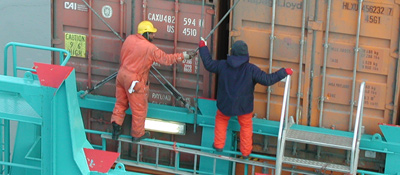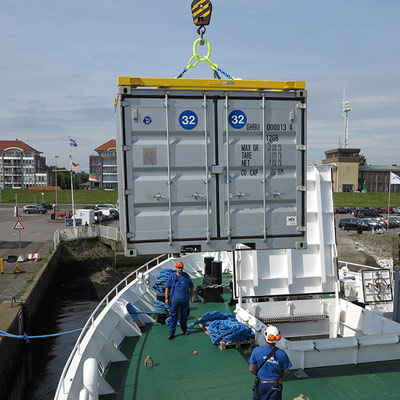BG Verkehr / Dienststelle Schiffssicherheit
Referat ISM/ILO - Bereich ISM-Code
Brandstwiete 1
20457 Hamburg
Fax: +49 40 361 37-204
Berufsgenossenschaft Verkehrswirtschaft Post-Logistik Telekommunikation (BG Verkehr)
Geschäftsbereich Prävention
Ottenser Hauptstr. 54
22765 Hamburg
Referat Seeschifffahrt und Fischerei
Phone: +49 40 39802754
Fax: +49 40 39801999
Mail: seeschifffahrt@bg-verkehr.de
Arbeitsschutzbehörden der Länder
Liste der Arbeitsschutzbehörden der Küsten-Bundesländer:
Kontaktdaten der Arbeitsschutzbehörden
Wasserschutzpolizei Hamburg
Dienststelle WSP 032, Zentralstelle für Gefahrgutüberwachung
Wilstorfer Str. 100
21073 Hamburg
Phone: + 49 40 42 86 - 65 471
Fax: + 49 40 42 86 - 65 473
Mail: wsp032@polizei.hamburg.de
Wasserschutzpolizei Niedersachsen
Zentrale Polizeidirektion
Neckarstraße 10
26382 Wilhelmshaven
Abteilung 2, Dezernat 24
Phone: + 49 4421 942-0
Fax: +49 4421 942-150
Mail: dezernat24@zpd.polizei.niedersachsen.de
Wasserschutzpolizei Bremen
Direktion Wasserschutz- und Verkehrspolizei
Daniel-von-Büren-Str. 2b
28195 Bremen
Phone: +49 421 362-9824
Fax: + 49 421 362-9829
Mail: office@polizei.bremen.de
Wasserschutzpolizei Schleswig-Holstein
Landespolizeiamt Schleswig-Holstein
Mühlenweg 166
24106 Kiel
Abteilung 4, Dezernat 13
Phone: + 49 431 160 0
Fax: +49 431 988 644 1130
Mail: kiel.lpa4@polizei.landsh.de
Wasserschutzpolizei Mecklenburg-Vorpommern
Landeswasserschutzpolizeiamt Mecklenburg-Vorpommern
Hohe Tannen 10
18196 Waldeck
Phone: + 49 38 208 88 73 111
Fax: +49 38 208 88 73 116
Mail: lwspa@polmv.de
Occupational health and safety
Top priority: a high standard of occupational health and safety
The workplace on board of sea-going ships is a dangerous one even today. Weather conditions such as heavy seas directly impair the safety of working on board. Cargoes, often including dangerous goods, must be loaded, carried and discharged with care. Fire on board can quickly have catastrophic consequences and must therefore be prevented at all costs. Injuries inflicted during work on machinery or electrical installations can only be treated by lay-people, as the oceans are out of reach for land based medical emergency services. In short: a high standard of occupational health and safety is an absolute necessity! In this context the German flag state administration offers a wide variety of information and advice to seafarers and shipping companies.
Employers are responsible for accident prevention
Employers are responsible for occupational health and safety of their employees. They are obliged to introduce all necessary measures and to ensure their continuous development. They must also appoint company doctors and experts for occupational safety, who will support and advise them on all questions regarding occupational health and safety.
Risk assessment
Both, the German occupational health and safety act (Arbeitsschutzgesetz) and the German accident prevention regulation "Principles of Prevention (BGV A1, "Unfallverhütungsvorschrift "Grundsätze der Prävention" ) oblige every employer - independent of the number of his employees - to conduct a risk assessment. In ocean shipping an on-board risk evaluation is prescribed by the international Maritime Labour Convention.
The employer is obliged to identify and assess any risks in his company. The results of the risk assessment, the measures introduced to ensure occupational health and safety as well as the results of their review must be documented. The details of the risk assessment are not specified in the legal provisions.
Employers may conduct the risk assessment themselves or delegate it to other specialists, e.g. to experts for occupational safety or company doctors. The responsibility however, cannot be delegated.
The Federal Institute for Occupational Safety and Health (Bundesanstalt für Arbeitsschutz und Arbeitsmedizin, BAuA) offers further information on risk assessment in general. Relevant advice to ocean shipping companies is provided by the Referat Seeschifffahrt (fisheries and shipping department) of the BG Verkehr. You can find sample risk assessments for certain types of on-board activities on the website of the BG Verkehr.

Printed information on occupational health and safety in ocean shipping
The "Geschäftsbereich Prävention" (directorate preventative measures) of the BG Verkehr provides extensive information materials on the management of occupational health and safety on board sea-going ships. In particular the Maritime manual - occupational health and safety in ocean shipping and fishing ("Handbuch See - Arbeitssicherheit und Gesundheitsschutz in der Seeschifffahrt und Fischerei") contains many appropriate practical hints and tips for everyday situations on board The text of many relevant laws and further information can be found in the "Kompendium Arbeitsschutz".
Further information on management of occupational health and safety on board, on regulations of the German seamen's accident and prevention insurance association, on deployment and use of personal protective equipment, on a safe design of work processes or just generally on safe working and living conditions on board can be found under the following headings on the BG Verkehr website (only in German):
Companies must have experts for occupational safety
According to section 6 of the German Arbeitssicherheitsgesetz (occupational health and safety act), an employer must appoint "experts for occupational safety" (safety engineer, technician, foreman) in writing. These experts have to advise their employer and other personnel responsible for occupational health and safety in all matters pertaining to occupational health and safety.
Further information on experts for occupational safety can be found at Sifa-online (only in German).
Experts for occupational safety in ocean shipping
In ocean shipping the experts for occupational safety (the earlier term "FASI" is now changed to "Sifa") formerly existed in two variants:
- as "on-board expert for occupational safety" for each ship, and
- as "expert for occupational safety for the shipping company" ashore
Today this former differentiation is obsolete. The qualification "on-board expert for occupational safety" is no longer accepted and the relevant training no longer available. The former "expert for occupational safety for the shipping company" on the other hand, is still recognized, due to the comprehensive training required for this "Sifa" qualification ("Sifa" = Sicherheitsfachkraft, expert for occupational safety). The Berufsgenossenschaft für Transport und Verkehrswirtschaft (BG Verkehr, Geschäftsbereich Prävention) offers this (Sifa) training with a focus on shipping.

On-board safety representatives
In addition to the expert for occupational safety, on each ship with five or more crew members an on-board safety representative has to be appointed. His tasks are mandatorily specified for each company to ensure a focus on practical matters. The safety representatives are welcome to enrol in a voluntary one-week training course offered by the BG Verkehr to familiarize themselves with their tasks. The legal basis for the appointment of a safety representative is section 116 of the German Seearbeitsgesetz (maritime labour law), which, as a more specific regulation, takes precedence over section 22, paragraph 1, clause 1, of Volume VII of the German social insurance code (SGB VII).
Contact details
The German federal state-level occupational health and safety authorities are responsible for checking whether experts for occupational safety have been appointed for the shore-based branch of the company. Which authority is responsible depends on the location of the company’s headquarters. The city of Hamburg has compiled a list of the coastal occupational health and safety authorities responsible for ocean shipping with their contact details.
Furthermore, the German Social Accident Insurance Institution for Commercial Transport, Postal Logistics and Telecommunication (Referat Seeschifffahrt = shipping department) offers advice to shipping companies regarding the expert for occupational safety as well as relevant training courses.
Dangerous goods are the concern of the dangerous goods officer
A shipping company must appoint a dangerous goods officer when its sea-going fleet transports dangerous goods. This may be an appropriately qualified person either employed ashore by the shipping company or hired externally. The German "Industrie- und Handelskammern" (Chambers of Commerce and Industry) offer training courses for the training of dangerous goods officer.

Training certificate required for masters and cargo officers
In addition to assigning a dangerous goods officer, the shipowner has to instruct his masters and cargo officers at least every 5 years about the requirements regarding dangerous goods. This instruction by the shipowner or by an external provider assigned by him is required according to section 4 paragraph 11 of the “Gefahrgutverordnung See” (GGVSee = maritime ordinance on dangerous goods). The shipowner has to document these instructions.
By way of exception, a separate instruction is not necessary if the captain’s or cargo officer’s final certificate of a maritime training institution – or an equivalent document – is not older than 5 years. The essential evidence is that the contents of teaching of the area of competence “carriage of dangerous goods” according to table A-II/2 of the STCW Code was taught.
Special training requirements for personnel on tankers
The required special tanker training has to be performed according to the internationally agreed standard and needs no additional national endorsement.
Special training requirements for shore-based personnel
Shipping companies with shore-based personnel directly involved in cargo operations - e.g., accepting dangerous goods, preparing transport documents and preparing stowage plans for dangerous goods – must ensure that the employees are instructed in accordance with their responsibilities. Legal basis for the instruction obligation is section 4, paragraph 12 of the German Gefahrgutverordnung See (GGVSee = maritime ordinance on dangerous goods).


